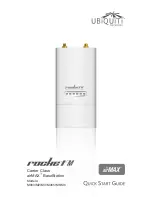
AT-GS950/48 Web Interface User Guide
287
In User authentication. For configuration information, see
“RADIUS Client” on page 290, “” on page 293, or
“Dial-in User— Local Authentication” on page 296.
MAC Based
: MAC Based authentication mode is specified. For
more information about configuring this mode, see “Destination
MAC Filter” on page 299.
Port Control
: This parameter specifies the port-based
authentication role. The pull-down menu choices are as follows:
Forced Unauthorized
: This parameter sets the port to the
802.1x authenticator role, in the unauthorized state. Although
the ports are in the authenticator role, the switch blocks all
authentication on the ports, which means that no clients can log
on and forward packets through them.
Auto
: Sets the port to the 802.1x port-based authenticator role.
Ports begin in the unauthorized state, forwarding only EAPOL
frames, until a client has successfully logged on.
Forced Authorized
: Sets a port to Forced-Authorized port
control. Ports that are set to the force-authorized state transition
to the authorized state without any authentication exchanges
required. The ports transmit and receive traffic normally without
802.1x based authentication of the clients.
Re-authentication Status
: This parameter activates or de-
activates the reauthentication on the authenticator ports.
Enabled
: Configures the port to activate reauthentication on the
authenticator ports. The clients must periodically reauthenticate
according to the time interval set with the Re-authentication
Period.
Disabled
: Configures the port to remove reauthentication from
authenticator ports so that clients do not have to periodically
reauthenticate after the initial authentication. Reauthentication is
still required if there is a change to the status of the link between
a client and the switch, or the switch is reset or power cycled.
Control Direction
: The port authentication is set to
“
Both
”
meaning both transmit and receive packets are affected. You
cannot change this parameter.
Supplicant Mode
: This parameter specifies if one or more
supplicants can be authenticated on a port.
Single
: The port is set to permit only one supplicant to log on
and forwards only the traffic of that supplicant. After one
supplicant has logged on, the port discards packets from any
other supplicant.
Summary of Contents for AT-GS950/48
Page 10: ...Contents 10...
Page 14: ...Figures 14...
Page 16: ...List of Tables 16...
Page 20: ...Preface 20...
Page 22: ...22...
Page 62: ...Chapter 2 System Configuration 62...
Page 64: ...64...
Page 108: ...Chapter 6 Static Port Trunking 108...
Page 124: ...Chapter 8 Port Mirroring 124...
Page 186: ...Chapter 13 Virtual LANs 186...
Page 194: ...Chapter 14 GVRP 194...
Page 210: ...210...
Page 224: ...Chapter 16 SNMPv1 and v2c 224...
Page 242: ...Chapter 17 SNMPv3 242...
Page 258: ...Chapter 18 Access Control Configuration 258...
Page 272: ...Chapter 19 RMON 272...
Page 302: ...Chapter 21 Security 302...
Page 324: ...Chapter 23 LLDP 324...
Page 338: ...338...
Page 356: ...Chapter 27 LED ECO Mode 356...
Page 360: ...Chapter 28 Energy Efficient Ethernet 360...
Page 370: ...Chapter 29 Rebooting the AT GS950 48 370...
Page 392: ...Appendix A MSTP Overview 392...
















































